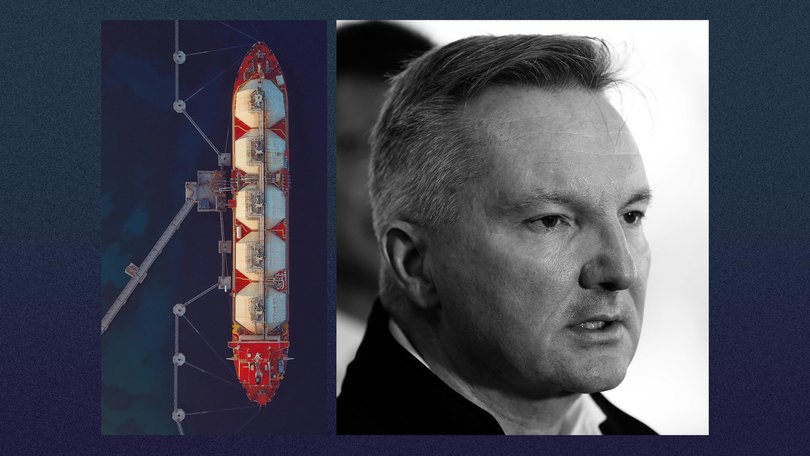AARON PATRICK: Energy Minister Chris Bowen has attacked gas for years. Now he’s a believer
AARON PATRICK: A fear that the East Coast will run out of gas this summer has forced the energy minister to acknowledge that gas is essential to the economy.

Despite being the second-biggest exporter of liquefied natural gas, Australia is running out of gas.
This unsustainable contradiction is why Energy Minister Chris Bowen, on Monday, initiated a short, formal review of the rules governing the wholesale gas market.
The review may be a turning point in energy policy under the Albanese Labor government: gas looks like it is on the way back.
Sign up to The Nightly's newsletters.
Get the first look at the digital newspaper, curated daily stories and breaking headlines delivered to your inbox.
By continuing you agree to our Terms and Privacy Policy.After four years of hostility, Energy and Climate Change Minister Chris Bowen described gas as “the ultimate backstop in our energy grid”. One lobbyist group said they had never heard Mr Bowen speak so positively about gas.
The problem is straightforward to identify and devilishly complex to fix. Because coal power plants are being phased out, and Mr Bowen’s beloved solar and wind power plants are not 100 per cent reliable, only gas can fill the gap for the moment.
But the Bass Strait gas fields that have kept showers warm and factories running for half a century are running dry.
Victoria going dark?
On Monday, the competition regulator said there might not be enough gas to supply Victoria, NSW and Queensland in the last three months of this year, and into 2026. It will depend, in part, on whether a hot summer means millions of Melburnians don’t have to switch on their gas heaters.
In Melbourne, with the outside temperature at 12 degrees, The Nightly asked one of Australia’s leading energy experts, Tony Wood, if he feared Victoria would run out of gas this year.
“I’ve got my passport up to date and am ready to move back to Queensland,” he said. “This issue is one of the worst failures of energy policy I’ve seen.”
(No gas crosses the Nullarbor Plain, ensuring Western Australia is a separate market.)
Stopping exports
There are two main ways to fix the problem: extract more gas from the ground, or stop shipping LNG to Japan, South Korea, China and elsewhere.
Export controls are referred to as gas reservations to make them sound friendly. Although superficially appealing, they can be counter-productive.
Only very big energy companies such as Santos, Shell and Exxon have enough capital to build plants that can produce gas in large quantities. If they can’t sell it overseas, where the prices are higher, their businesses will become uneconomical.
Which helps explain why Mr Bowen, on Monday, opposed restrictions on the export of gas produced on the east coast from existing plants, a policy the Coalition proposed before this year’s election.
New projects could be covered, though. Businesses would know the rules before investing.
“New supply, wholly for export, will not help Australia’s domestic gas needs,” Mr Bowen said. “One thing we won’t contemplate is ripping up existing contracts, creating sovereign risk, engaging in behaviours which would see Australia as an unreliable supplier of gas.”
Predictable profits
Mr Bowen and Resources Minister Madeleine King will not chair the review. But they would not be politicians if they did not set it up without objectives in mind.
Introducing rules that make gas producers’ profits more predictable would help open up new gas fields.
Santos, for example, has been working on the Narrabri gas field in northern NSW since 2011. Opposition from local residents, court challenges and a complicated planning system have frustrated the project, which would not send gas overseas.
Those who fear the threat to life on earth from climate change will not be happy, including climate-independent MP Zali Steggall.
“I am concerned that the minister has left the door open to exploring new gas supply as it undermines Australia’s climate commitments,” she told The Nightly.
The departments of climate change, energy, the environment, water, industry, science and resources reported on Monday that demand for gas will not drop between now and 2044, which is the furthest date of the official forecasts.
Even Victoria’s left-wing government pulled back last week from tough anti-gas policies. Gas cookers will not be banned in new homes. Broken gas heaters will not have to be replaced with electric ones.
Part of the problem is that switching the electricity grid to solar and wind power has proven more difficult and expensive than most people expected.
Perhaps the clearest indicator of the shift in attitudes is Mr Bowen’s rhetoric. He used to blame higher electricity prices on a lack of renewable energy.
His gas conversion is an indication of how the debate has changed.

